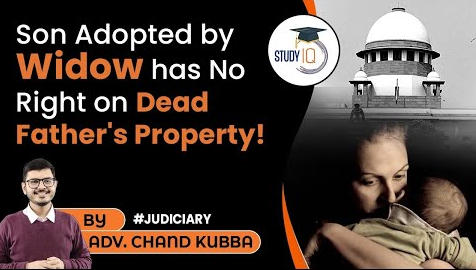Capacity of a male Hindu to take in adoption-
- Any male Hindu who is of sound mi
- nd and is not a minor has the capacity to take a son or a daughter in adoption.
- Provided that, if he has a wife living, he shall not adopt except with the consent of his wife unless the wife has completely and finally renounced the world or has ceased to be a Hindu or has been declared by a court of competent jurisdiction to be of unsound mind.
Capacity of a female Hindu to take in adoption-
- Any female Hindu-
- (a) who is of sound mind,
- (b) who is not a minor, and
- (c) who is not married, or
- if married, whose marriage has been dissolved or whose husband is dead or has completely and finally renounced the world or has ceased to be a Hindu or has been declared by a court of competent jurisdiction to be of unsound mind,
- has the capacity to take a son or daughter in adoption.
Persons who may be adopted-
- No person shall be capable of being taken in adoption unless the following conditions are fulfilled, namely-
- (i) he or she is a Hindu;
- (ii) he or she has not already been adopted;
- (iii) he or she has not been married, unless there is a custom or usage applicable to the parties which permits persons who are married being taken in adoption;
- (iv) he or she has not completed the age of fifteen years, unless there is a custom or usage applicable to the parties which permits persons who have completed the age of fifteen years being taken in adoption.
Other conditions for a valid adoption-
- In every adoption, the following conditions must be complied with:
- if any adoption is of a son, the adoptive father or mother by whom the adoption is made must not have a Hindu son, son’s son or son’s son’s son (whether by legitimate blood relationship or by adoption) living at the time of adoption;
- if the adoption is of a daughter the adoptive father or mother by whom the adoption is made must not have a Hindu daughter or son’s daughter (whether by legitimate blood relationship or by adoption) living at the time of adoption;
- if the adoption is by a male and the person to be adopted is a female, the adoptive father is at least twenty-one years older than the person to be adopted;
- if the adoption is by a female and the person to be adopted is a male, the adoptive mother is at least twenty-one years older than the person to be adopted;
- the same child may not be adopted simultaneously by two or more persons
- the child to be adopted must be actually given and taken in adoption by the parents or guardian concerned or under their authority with intent to transfer the child from the family of its birth or in the case of an abandoned child or a child whose parentage is not known, from the place or family where it has been brought up to the family of its adoption. Provided that the performance of datta homan, shall not be essential to the validity of an adoption.
In the given Case-
- The said couple had only a daughter, a biological child.
- Husband died in 1965.
- Wife adopted the son in 1973.
- Son contended that since he is an adopted son, he will have equal rights in the properties of his father just like his adoptive mother.
Single-judge Justice Shrikant Kulkarni
-
- “It is an admitted position that the husband of Kausalyabai died in the year 1965 which is much before the adoption of son Shivaji…. Therefore, it is clear that adopted son Shivaji was not inpicture when her husband died in theyear 1965, intestate. The succession opens for the first time in the year 1965. According to Section 8 of the Hindu Succession Act, 1956, Kausalyabai being widow and Parwatibai being daughter would get one half share each in the suit property left behind by Sopanrao,”
- The Court further held that Daughter would get 3/4th (1/2 from father’s properties and 1/2 from mother’s 1/4 share) share in the properties while Shivaji can claim right in 1/4th share.
- “After coming into force of Hindu Adoptions and Maintenance Act, 1956, the child adopted by the widow of the co-parcener, does not get the status of the child of deceased co-parcener from the date of death of co-parcener. As such, adopted son/original defendant No.1 cannot claim share in the suit property, by stepping into the shoes of his late father who died much before his adoption”






















 WhatsApp
WhatsApp